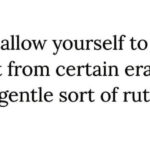Rules
Questions have come up a couple of times recently … about rules. Kirsten Johnson and I were discussing the necessity of breaking the rules sometimes, or at least bending them .. or can they be transformed?
Keeping the rules can be life-saving – like the rule about staying on your side of the road – and everyone counts on everyone keeping that rule and others governing road safety, and safety in general. All of which can be deluding to the undiscerning, if they conclude that rules equal safe which equals homeostasis (which, if prolonged, equals stagnant in my book).
I'm probably going to get into trouble for saying this … but … the psychotherapy profession has a rule that prohibits equal-equal relationships. It is based on old theory which says that the patient needs to learn to trust the therapist, therefore the therapist has to maintain a "one-up" status, so they can guide the patient through some difficult passage.
So my first breaking of rules is that I refuse to call those with whom I work "patients" – which infers that they are the sick ones (and by extension, I am the well one). A one-up/one-down relationship – personally disempowering for the "patient," and downright dangerous for the therapist's humanity.
My experience in working with Ann Barnett (my psychotherapy mentor), and subsequently my experience in working with others is contrary to that paradigm (excluding severe mental disorders here). It seems to me that we (psychotherapists) should be facilitating others to trust Themselves to lead their own life … not us (or anyone else). That paradigm was confirmed for me by the More To Life Program, which teaches exactly that. And while that program is not psychotherapy, it does happen to be therapeutic. In my estimation, that psychotherapy rule needs to be transformed to fit a new paradigm – one that empowers people to have faith in themselves and their personal destiny, one that empowers therapists to be shoulder to shoulder with their clients through some difficult passage.
Transforming a rule requires transforming the paradigm it is meant to serve – a change in context. That usually starts with someone breaking the rule.
PS I am not advocating breaking rules. I am advocating discernment of reality, as always.





Hi Anne, I would like to talk with you about this sometime. Specifically, the therapist relationship paradigm is something that I struggle with as a therapist. I absolutely agree that the one up/one down relationship is the antithesis of healing, well those are my words. Thanks for writing this post.
I think “antithesis of healing” is an accurate description.
Don’t you acknowledge that this is high time to get the loans, which can help you.